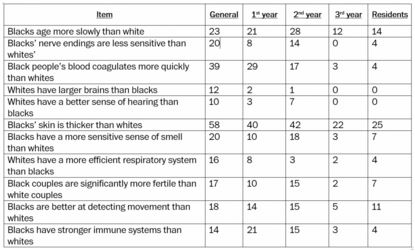A new study released Monday [April 3, 2016] has brought to light a stirring reality that reveals yet another disturbing predisposition against African-Americans.
At the University of Virginia, psychology researchers studied medical students through a quiz that evaluated how likely they were to believe medical and biological fallacies often associated with Black people in comparison to the white population. What they found was that more than half of the students surveyed were likely to agree with claims such as ‘Blacks’ skin in thicker than whites’ while a significant amount also agreed with ‘Blacks’ nerve endings are less sensitive than whites’.
The survey included a total of 222 white medical students, all native to the United States. The population was divided among 63 first-year students, 72 second-year students, 59 third-year students, and 28 residents. The chart below shows the number of individuals who endorsed each statement in percentages.

Percentage of white participants endorsing beliefs about biological differences between blacks and whites. (Courtesy of PNAS)
The entire study was divided into two parts. The first quizzed a random sample of white people who were not medical students. It succeeded at revealing that this sample of the general population was more likely to believe the false statements and conclude that Black patients experienced a lower pain rating than white patients.
Further analyzing these findings, the study then moved into its second phase in which it would probe medical students’ beliefs regarding the same topics. What was found was that medical students who endorsed these beliefs made less accurate and less effective recommendations for pain management for black patients in comparison to whites.
One of the most interesting findings, however, was that those medical students who did not endorse these beliefs still believed in the notion that Blacks and whites could not share the same biological responses, rating Black patients pain as being higher. However, participants did not make any changes in their pain recommendations, giving Blacks and whites the same treatment recommendations, despite believing that Blacks experience greater pain.
“These findings suggest that individuals with at least some medical training hold and may use false beliefs about biological differences between blacks and whites to inform medical judgments, which may contribute to racial disparities in pain assessment and treatment,” researchers concluded.
